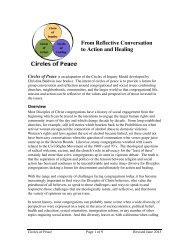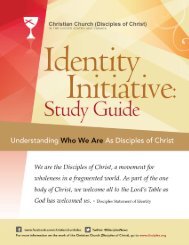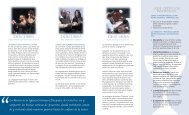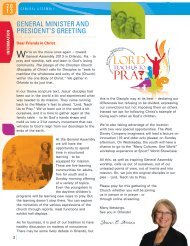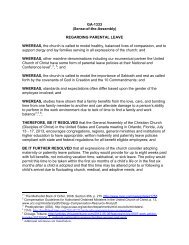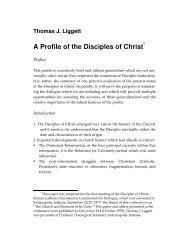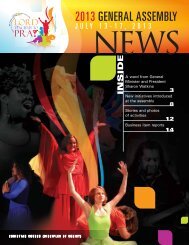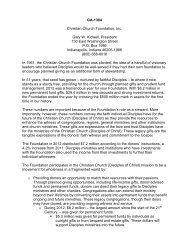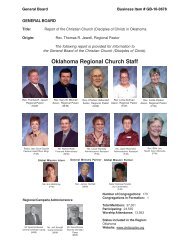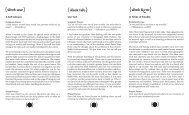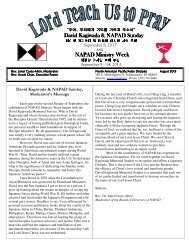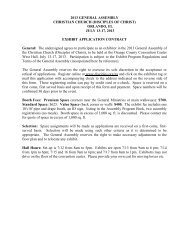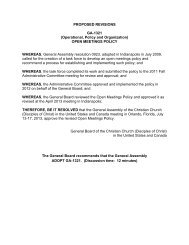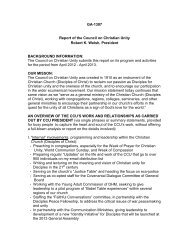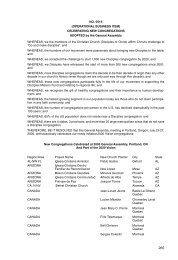RESOURCING THE CHURCH FOR ECUMENICAL MINISTRy A ...
RESOURCING THE CHURCH FOR ECUMENICAL MINISTRy A ...
RESOURCING THE CHURCH FOR ECUMENICAL MINISTRy A ...
Create successful ePaper yourself
Turn your PDF publications into a flip-book with our unique Google optimized e-Paper software.
• The challenge and opportunities of contextual and local<br />
ecumenism (Chris Morton, executive director of<br />
the Tacoma Associated Churches in Tacoma,<br />
WA, and Doug Lofton, senior minister at<br />
Southport Christian Church, Indianapolis,<br />
IN)<br />
• The challenge of maintaining unity and the church’s<br />
prophetic witness in the world (Nathan Wilson,<br />
pastor of First Christian Church, Shelbyville,<br />
IN, and Kris Culp, dean of the Disciples<br />
Divinity House at Chicago University in<br />
Chicago, IL)<br />
A major piece of the Conference design was the<br />
small groups that discussed the Bible studies and<br />
presentations. These small groups also offered<br />
insights and recommendations regarding the<br />
nature of the vision of the unity we seek and future<br />
work and program of the Council on Christian<br />
Unity.<br />
Affirmations and Insights<br />
Growing out of the rich discussion, worship, and<br />
small group conversations, several recurring themes,<br />
affirmations and new insights on the nature of God’s call<br />
to unity and reconciliation emerged as key elements<br />
for our Disciples’ understanding and practice:<br />
A. Basic affirmations:<br />
• We affirmed that unity, understood as God’s gift<br />
and calling, is central to our Disciples’ identity<br />
and stands as our distinctive witness as a<br />
church.<br />
• We affirmed that unity is not for its own sake,<br />
but for the sake and salvation of the world;<br />
unity is for the sake of mission as we manifest<br />
the oneness that God has already given to the<br />
church.<br />
• We affirmed the celebration of the Lord’s<br />
Supper at an “open Table” as the historic<br />
practice of the Disciples that is essential to our<br />
understanding of and witness to unity; we do<br />
not get to exclude those whom Jesus loves,<br />
saves, invites and welcomes.<br />
• We affirmed the need to be more intentional in<br />
our teaching about baptism as the foundational<br />
event establishing our unity in Christ with all<br />
Christians.<br />
53<br />
• We affirmed that Scripture and the apostolic<br />
faith of the whole church are both source and<br />
resource to our work for unity, reconciliation<br />
and wholeness.<br />
• We affirmed that if Christian unity is to be real<br />
for Disciples, it must be local and make a<br />
difference in the lives of individuals and<br />
congregations; indeed, local experience must<br />
inform and shape our overall ecumenical<br />
witness and involvements as a church.<br />
• We affirmed and celebrated the changing<br />
context of our life today as a church<br />
experiencing rapid growth in becoming a more<br />
multicultural, multi-ethnic and inclusive<br />
community of faith.<br />
• We affirmed the need to reach out to a new<br />
generation of Disciples, especially to youth and<br />
young adults, who bring different gifts, insights<br />
and perspectives to our church’s total life,<br />
witness and agenda.<br />
• We affirmed that the relationship between<br />
Christians and people of other faiths is playing<br />
an ever more important role in the life of the<br />
church today; we are, thus, called to respond to<br />
the challenge of relating the search for<br />
Christian unity to interfaith dialogue and<br />
engagement.<br />
• We affirmed that there can be no true unity<br />
within the church that does not include a<br />
passion for justice, peace and compassion in<br />
our society and world.<br />
• We affirmed that greater communication and<br />
more theological resources are needed for the<br />
ecumenical education and formation of<br />
Disciples to articulate and practice Christian<br />
unity.<br />
• We affirmed the Disciples’ commitment to<br />
working through councils of churches and<br />
ecumenical organizations as an expression of<br />
our own life and witness which not only extends<br />
our resources (i.e., good stewardship) but is<br />
also true to our identity as a people of unity.<br />
B. New insights:<br />
• Disciples have long claimed that “Christian unity is<br />
our polar star,” a phase that was first used by Barton<br />
W. Stone, one of the early founders of our<br />
movement.<br />
Report of the Visioning Conference on Christian Unity



